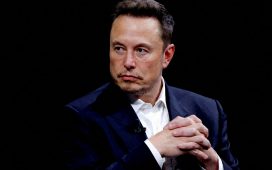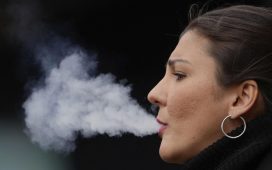President Trump
Trump’s move, which came after the business community lobbied against the use of the emergency powers, forces GM to prioritize ventilators after a deal with the White House faltered.
“Our fight against the virus is too urgent to allow the give-and-take of the contracting process to continue to run its normal course,” Trump said in a statement. “GM was wasting time. Today’s action will help ensure the quick production of ventilators that will save American lives.”
Trump also said the country “will be making over 100,000 pretty quickly.” States have warned of a dangerous shortage of the breathing machines.
Trump also tapped White House aide Peter Navarro to coordinate policies enacted under the Korean War-era law that gives the president broad authority to increase the manufacturing output of critical items in times of national emergency, including public health crises.
“My order establishes that Peter will serve as national Defense Production Act policy coordinator for the federal government,” Trump said Friday during a White House briefing. “That’s a very important position. More important probably than it’s almost ever been in our country.”
The president has been under pressure from former Vice President Joe Biden
But the moves Friday suggest he is now leaning into the use of the act.
Biden and others have called on the administration to use it to force the production of surgical masks and other protective equipment for health workers.
Business groups like the U.S. Chamber of Commerce for weeks had been pressing the administration to not use the act, arguing that government intervention was unnecessary because private industry would meet the pandemic’s increased demand.
The Chamber did not immediately respond to a request for comment.
GM, after Trump’s move, said that its joint effort to produce ventilators amid reports of widespread shortages had “never wavered.”
“Ventec, GM and our supply base have been working around the clock for over a week to meet this urgent need,” a GM official told The Hill after Trump’s announcement. “The entire GM team is proud to support this initiative.”
Trump’s actions with GM created a bit of whiplash.
At a Thursday press conference, even as the U.S. surpassed China as the country with the highest number of confirmed cases — with some 86,000 infections and more than 1,300 deaths — Trump defended his decision to not use the DPA forcefully.
Trump touted the volume of equipment that had been delivered so far, noting more than 9 million N95 respirator masks had been shipped, as had millions of other personal protective items and nearly 6,000 ventilators.
“Frankly they don’t need somebody to walk over there with a hammer and say, do it,” Trump said, referring to private companies engaged in the relief effort. “They are getting it done. They’re making tremendous amounts of equipment.”
A day after invoking the DPA, which set in motion his ability to mobilize U.S. industry to address the pandemic, Trump on Twitter said he would use the law’s manufacturing provision only for “a worst-case scenario in the future,” adding that “hopefully there will be no need.”
Several governors, dozens of U.S. senators, 16 state attorneys general and the American Hospital Association, American Medical Association, and American Nurses Association had all urged Trump to use his powers under the DPA to increase supplies.
In Louisiana, which this week saw the fastest coronavirus growth rate worldwide, Gov. John Bel Edwards (D) warned that New Orleans could run out of ventilators in the coming days.
By Friday, Trump was haranguing GM’s top executive, Mary Barra.
“As usual with ‘this’ General Motors, things just never seem to work out,” Trump tweeted. “They said they were going to give us 40,000 much needed Ventilators, “very quickly”. Now they are saying it will only be 6000, in late April, and they want top dollar. Always a mess with Mary B. Invoke ‘P.’ ”
In subsequent tweets, Trump said that “Invoke ‘P’ ” was a reference to invoking the DPA.
Jay Timmons, who heads the National Association of Manufacturers, appeared to rush to GM’s defense in response to Trump’s tweet, touting the company’s work to produce ventilators and masks.
“Just as we were the ‘arsenal of democracy’ in WWII, we are leading the way to combat this latest war. @ShopfloorNAM appreciates @GM for all they are doing as part of that arsenal,” Timmons tweeted.
On Friday, before Trump invoked the DPA, Neil Bradley, the Chamber’s executive vice president and chief policy officer, told The Hill that the move would be unnecessary.
Because companies had already stepped up to address the country’s needs, Bradley said, the call for more DPA authority is like a solution in search of a problem, adding, “Should we do something that won’t produce any positive effect just because we can say we did it?”
On Friday, the Chamber also launched a tool that showcased corporate America’s robust contribution to combat the coronavirus pandemic.
“When the issue of DPA comes up, it’s a question of would that allow us to do something that we couldn’t otherwise do?” Bradley said Friday afternoon. “Or [would it] help us meet the needs, at least with respect to increasing production itself? The answer is no.”
But by Friday evening, Trump signed a presidential memorandum placing at least some of GM’s production lines in the hands of the Department of Health and Human Services.
Trump’s order directed his administration to use “any and all authority available under the Defense Production Act to require General Motors to accept, perform, and prioritize Federal contracts for ventilators.”






